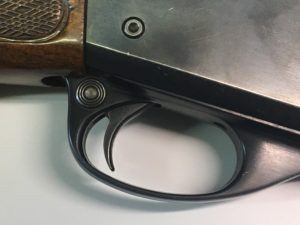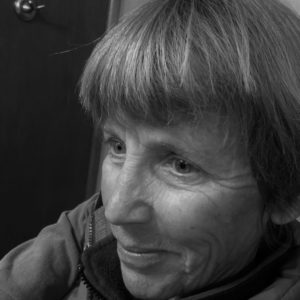 This is what you should know about me: I own a gun. It’s a honey-colored 20-gauge shotgun. The metal barrel smells like cold fire, and the gun has a heft to it that I’ve never grown into. It was a gift to me from my mother when I turned 18. The stock was too long for me then because I was expected to lengthen out. Whenever I shot my gun I’d have to do a little extra motion, an out and up motion, which gave my victims a little extra time to live. That was fine by me—I didn’t enjoy their deaths. I was neither a good nor a bad shot, just an unwilling one.
This is what you should know about me: I own a gun. It’s a honey-colored 20-gauge shotgun. The metal barrel smells like cold fire, and the gun has a heft to it that I’ve never grown into. It was a gift to me from my mother when I turned 18. The stock was too long for me then because I was expected to lengthen out. Whenever I shot my gun I’d have to do a little extra motion, an out and up motion, which gave my victims a little extra time to live. That was fine by me—I didn’t enjoy their deaths. I was neither a good nor a bad shot, just an unwilling one.
One day I realized I didn’t have to kill things anymore, but that led to a different dilemma: If I wasn’t doing the killing, someone else would have to do the killing for me. Whatever I ate was a being, sometimes called a thing, whose life was sacrificed to perpetuate mine. The small game birds that were my targets, and often my victims, had no choice in the matter. They did their own killing of bugs and seeds in order to live, then flung themselves into the air and became my dinner.
Let me tell you what I liked about my gun. I liked the smell of it. I liked polishing its barrel and cleaning its bore. I liked oiling its stock that was too long for me. At the end of the day I liked reaching up and placing it between my father’s 4.10 and my mother’s 12-gauge in the glass-fronted gun rack built above the butcher block counter in the gun room. I liked taking my gun down from the rack before dawn on duck-shooting mornings. I liked paddling across the duck pond in the dark, arriving at a blind and waiting there in the chill while the sound of duck wings tore the air above my head. They sounded like incoming missiles. And I liked spotting doves a long distance away and following them with my heart as much as my gun, sometimes shooting at them and often not. I liked walking with a dog that was young and not well-trained, a dog that spooked up the quail. And the quail sounded like gunfire as they took off with a whirring of wings that exhilarated and frightened.
The beauty in not killing was far greater than any satisfaction in hitting a target, ending a life. What I liked about my gun was that it taught me to look and to wait and to summon all my attention. It taught me to love the details of the world lifting up around me.
Recently, after another mass killing, I read these words in the newspaper: “I don’t know how this could have been prevented.” The words shocked me. It was a way of washing the hands of responsibility, something which has become a cultural trend. What those words say is that we don’t know how to stop people who want to kill people from killing people. Is this really so? We know how to send messages through the air. We know how to make weapons of mass destruction, uber-weapons, and develop protocols and treaties and agreements and balances of power in order to keep them from being used to enact that for which they were made. We design objects that fly through space on predictable trajectories. We lie in bed while our coffee brews itself. We know how to treat mental illness. We know how to replace hearts. We know how to love. We know how to hate without violence. We know how to use guns without malicious intent. We know that while the weapons of war may be appropriate to war, they have no place in our domestic lives. We know that all guns are not created equal. And this is what we can control, this is how we can prevent. Because gun owners are not created equal either, and there is precious little we can do about that.
I don’t shoot my gun anymore. It doesn’t live in my house, and the hunting culture I grew up in seems distant, foreign. It has no place here in my present life. Now I eat what others have killed, instead of killing what others would eat. I thank the animal on my plate. It makes no difference, I’m told, but softens a perceived hypocrisy. I miss the sensual details around hunting but not the hunting itself. I miss the dark turning to dawn in a duck blind. I miss the sound of wings and the feeling of being buried by avian hearts beating fast. I miss the sound of survival and the smell and taste of gunpowder. In the best of worlds, a kind of love leads us to kill. When we track an animal correctly, we track it with appreciation and love. Empathy makes us successful hunters. It allows us to get inside an animal’s skin, to know its mind and habits and where and when it drinks and the paths it takes. Empathy makes us more than gun owners; it makes us hunters. It makes us part of something large and ancient and laced with life-giving energy and connection. As you read this you are thinking, ‘Yes…but….’ Please understand that I am thinking that, too.

